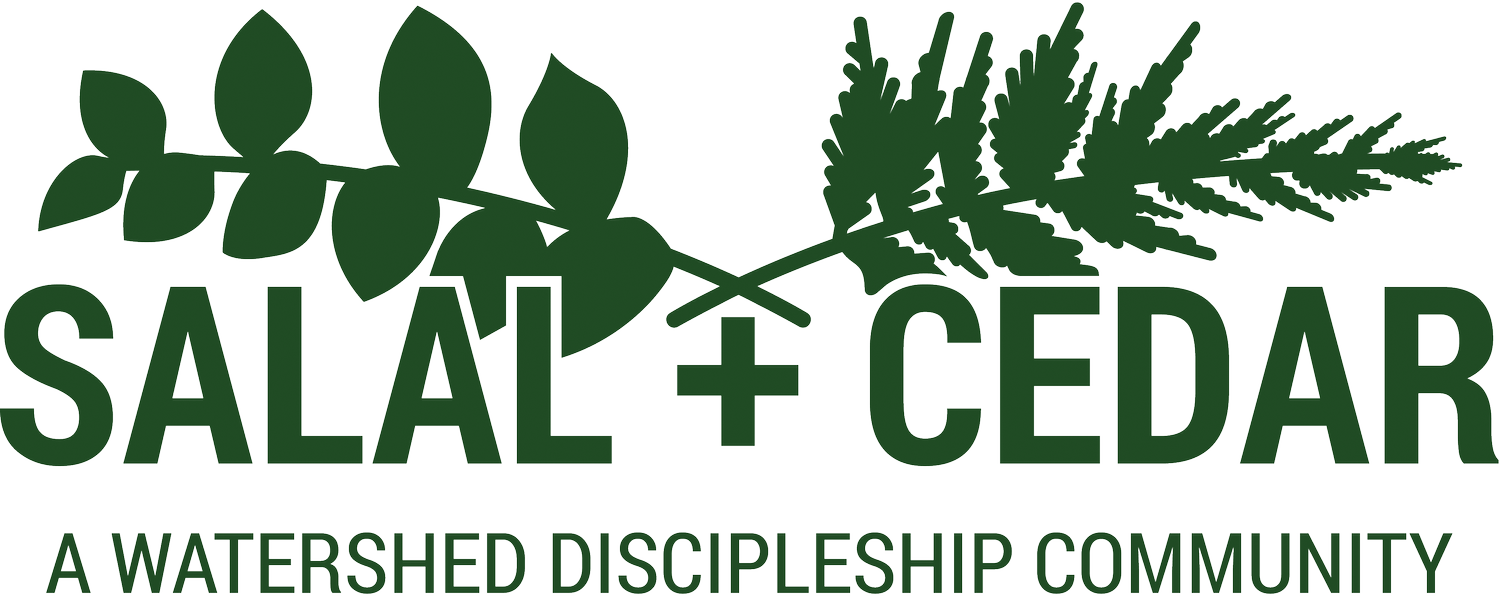FAQs
Where do you meet?
We worship at different outdoor locations in the lower mainland, usually parks or trails, sometimes contested places like the provincial court house or a pipeline construction site. If there is a place where you would like us to meet, invite us there. During the pandemic we have added gatherings by zoom.
Why do you meet outside?
Not everyone finds God in a building but many people feel a spiritual connection in the forest, by the water, or under the stars. We help people deepen their spiritual lives and grow their love of creation.
What if it rains?
Then we get wet. We have only had to cancel worship once when a wind-storm blew a tree down in front of one of our cars. We are often surprised by how often the skies clear on a rainy day.
What is Salal?
A tough persistent evergreen bush with large tough leaves and a string of purple berries that grows in the understory of the forest near the coast.
Do I have to be an Anglican to participate?
Nope, Salal + Cedar has a half-time Anglican priest and a volunteer deacon and is associated with the Diocese of New Westminster. While some of our members are Anglicans, we also have a fair number of Baptists, rogue Catholics and others.
Well, do I have to be a Christian?
Nope, we are a Christian church, our worship includes readings from the bible, paying attention to the Holy in nature and we share communion, the sacramental meal of bread and wine but if you are comfortable with that, we are glad to have you. If that all seems a bit much, then our contemplative walks might suit you better.
When do you meet?
Our current schedule is a little irregular: We meet at 4 PM on the 1st, 3rd, 4th and 5th Saturday by zoom or in person.
On the 2nd Saturday we join the Quaker-inspired meeting at the Kwekwecnewtxw Watch House on Burnaby Mountain at 10:30 AM.
We celebrate quarter days and cross quarters, usually in person with an extended celebration including food.
What are quarter days and cross quarters?
Salal + Cedar celebrates the solstices, equinoxes and the four days at the mid-points in between (Candlemas, May Day, Lammas, and All Souls) these holy days of the Celtic calendar mark key times in the northern European agricultural year, correspond to the church calendar and help us attend to the rhythm of the changing seasons.
Do you have education programs?
Heck, yes! We love to learn together through bible studies, book groups, retreats, and skill-shares. We can also bring these programs to other churches or organizations.
Do I have to be an activist?
Nope. Salal + Cedar members have a shared vocation for ecological justice and we want to support folks who care about climate justice to take the next steps that are right for them. For some of us this means we attend rallies and direct actions or participate in lobbying or court support together, you are always welcome to join us but you don’t have to.
What does Watershed Discipleship mean?
Watersheds are natural water drainage basins which divide up bioregions. Metaphorically we to refer to this time as a “watershed moment” in terms of climate crisis. Watershed Discipleship means asking, “What does it mean to be a follower of the Jesus Way here at this time, with the land, water, creatures, and people of this particular place?”
What do you mean by Mutual Aid and Solidarity?
Economic justice is important to us. On a small relational level we redistribute a portion of the money (12-17%) we raise each year to folks who need support (funeral expenses or childcare fees) and organizations that do some of the work that we wish we could (housing Indigenous land defenders, run a free pantry).
What do you mean by decolonizing?
Anglican church exists here on Coast Salish territory because of British colonialism. Most of our members’ families came here from elsewhere in the world to settle. We talk about these facts, and contemplate what it means for our community to be in right relation to the land and the people who were here first. We start our services by acknowledging that we meet on unceded territories and ask each other how we will live differently because of this. We try to follow Indigenous leadership in protecting land, water and show up when Indigenous people ask us to. We pay attention to how climate justice and racial justice are connected.
What’s all this about pronouns and access needs?
When we meet we invite participants to share their name, pronouns, and any access needs that will help them to participate fully (seating, scent-free, large print). We do this each time we gather, even if we all know each other because all of these are things that can and do change.
How do you do so much amazing stuff?
We love and believe in what we do, community members volunteer a lot of time, and we train and empower lay people for leadership roles but this work is not free and we appreciate financial support from folks who value this model of church.
How can I join you?
Get our weekly update with prayer concerns, education opportunities and worship schedule. Sign up below! You can also find our current schedule on our Events page.
